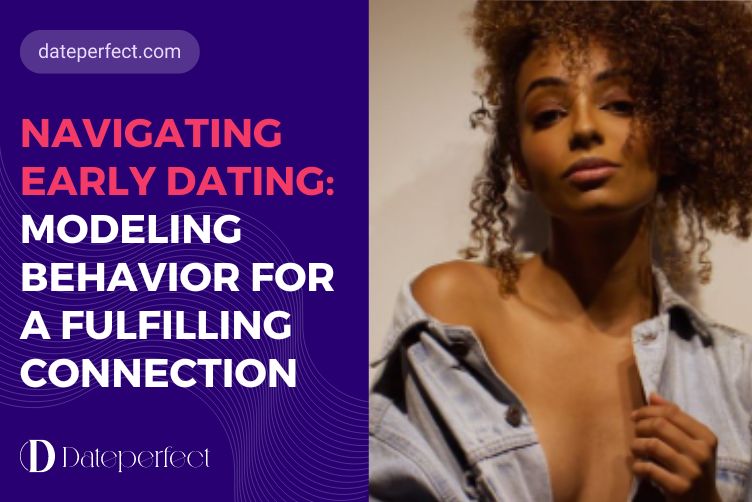Navigating Early Dating: Modeling Behavior for a Fulfilling Connection

Introduction: When it comes to early dating, many individuals find themselves in a state of uncertainty, seeking closure and clarity. However, instead of solely reacting to the existing dating culture, there is value in proactively shaping the dynamics. By understanding the power of reciprocity and modeling the behavior we desire, we can create a more fulfilling and authentic connection. In this article, we will explore the concept of reciprocity, the role of personal influence in dating, and how to navigate early dating with intention and courage.
The Quest for Closure in Early Dating:
Early dating often lacks the closure and certainty we crave in various aspects of life. We tend to focus on the other person’s intentions, patterns, and actions, neglecting our own influence in shaping the dynamic. Rather than passively seeking closure from someone else, it is crucial to acknowledge our role in the relationship and take proactive steps to create a culture that aligns with our desires.
Taking Charge of the Dating Culture:
In his book “Attached,” author and psychologist Dr. Amir Levine discusses protest behavior, a defensive approach to dating characterized by mirroring. Mirroring involves reacting to the other person’s behavior without initiating any action. However, solely mirroring can lead to a cycle of waiting for the other person to make a move, resulting in stagnant progress.
Instead of passively mirroring, we can be brave enough to create our own dating culture. Just as Mitchell Album suggests, if we don’t like the culture, we should be proactive in shaping it. This applies not only to dating but to various aspects of life where we often find ourselves reacting and complaining rather than taking the lead.
The Power of Reciprocity:
Reciprocity, a psychological phenomenon, highlights the influence our actions have on others. It emphasizes that if we initiate positive behavior, it is likely to elicit a reciprocal response. Conversely, if we remain passive and withhold our efforts, we are unlikely to receive the same in return. Understanding reciprocity enables us to take charge of the dating dynamic by modeling the behavior we desire.
Moving from Mirroring to Modeling:
While the principle of investing in someone based on their level of investment still holds merit, it is crucial to move beyond mirroring and embrace modeling. Mirroring is reactive, whereas modeling is proactive and requires courage. By modeling the behavior we want to see, we can initiate positive changes in the dating dynamic.
Modeling Behavior in Early Dating:
In the context of early dating, where closure and communication may be limited, modeling becomes even more important. Instead of waiting for the other person to take the lead, we can proactively reach out, demonstrate vulnerability, and initiate conversations that align with our desired level of connection.
For example, sending a simple message like “Hey, how’s your day? I was just thinking of you” or referencing a shared joke from a previous date shows genuine interest and establishes a connection. By doing so, we model open communication and express our desire to nurture the relationship.
Embracing Vulnerability and Intentions:
Modeling behavior also involves embracing vulnerability and expressing our intentions. It may entail picking up the phone and initiating a call, showcasing comfort with direct communication. Such actions demonstrate that we value meaningful conversations and provide an opportunity for the other person to reciprocate.
However, it is crucial to approach modeling without hidden agendas. The goal should be to create an environment where both individuals can feel comfortable expressing their intentions, building momentum, and fostering a genuine connection.
Conclusion:
Certainly! Here is a short list of advice on how to increase the likelihood of someone calling and texting you every day:
- Establish a Genuine Connection: Focus on building a strong emotional connection with the person you’re dating. Show genuine interest in their life, opinions, and experiences. By fostering a deeper connection, they will be more inclined to reach out to you regularly.
- Communicate Your Expectations: Openly communicate your desire for regular communication. Let the person know that you appreciate daily calls and texts as a way to stay connected and maintain the relationship. Clear communication about your needs can help set expectations from the beginning.
- Lead by Example: Be proactive in initiating communication yourself. Show them that you value regular contact by reaching out first. This will encourage them to reciprocate and keep the communication going.
- Be Engaging and Interesting: Keep the conversation engaging and interesting by sharing stories, experiences, and asking thoughtful questions. Be an active listener and show genuine curiosity in what they have to say. By being an engaging conversationalist, you increase the chances of them wanting to talk to you regularly.
- Balance Independence and Availability: While it’s important to show your interest and availability, it’s equally important to maintain a sense of independence. Avoid appearing overly clingy or dependent on their communication. Balance your availability by maintaining your own hobbies, interests, and social life.
- Respect Their Boundaries: Everyone has different preferences when it comes to communication. Respect their boundaries and understand that they may have other commitments or responsibilities that limit their availability. Give them the space they need while still expressing your desire for regular contact.
- Keep Things Positive and Supportive: Strive to maintain a positive and supportive tone in your conversations. Avoid excessive negativity, complaints, or neediness. Instead, focus on uplifting and encouraging discussions that make them feel good about connecting with you.
Remember, it’s essential to find someone who shares your communication style and desires. If your partner consistently fails to meet your needs or doesn’t show the same level of interest, it may be worth reevaluating the compatibility of the relationship.
Early dating often leaves us yearning for closure and certainty. By acknowledging our influence in shaping the dating dynamic and applying the principle of reciprocity, we can model the behavior we desire. Moving beyond reactive mirroring, we can take proactive steps to create.


